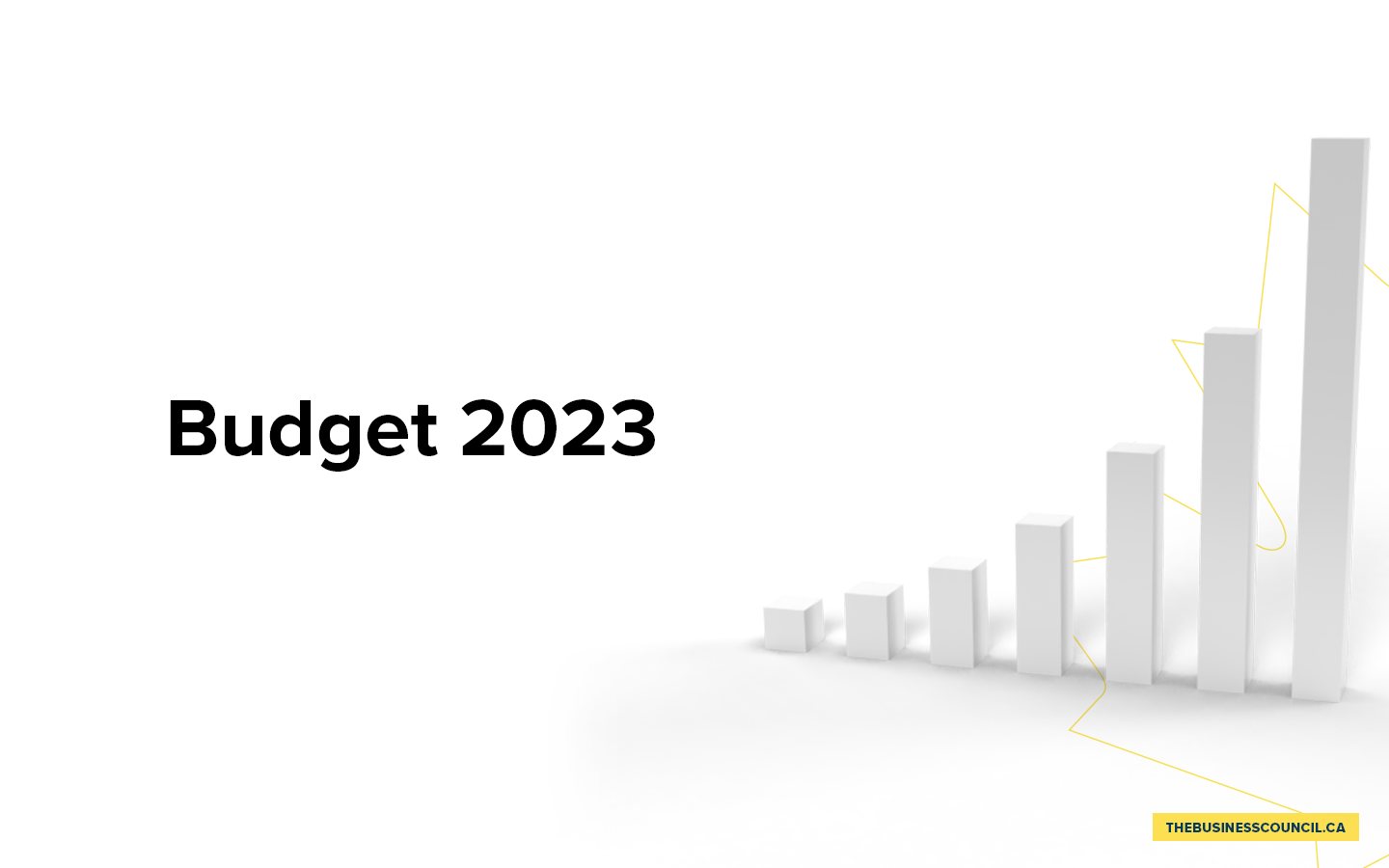Recommendations for Budget 2023
This letter was sent to the Honourable Chrystia Freeland, Deputy Prime Minister and Minister of Finance, in advance of the 2023 federal budget.
Dear Deputy Prime Minister,
As the new year unfolds, Canadians face an unusual confluence of economic risks and challenges.
Inflation and higher borrowing costs are squeezing household budgets. Employers are grappling with an exceptionally tight labour market. Fears of a looming recession in Canada and other advanced economies are widespread. Yet even in this challenging economic environment there are enormous opportunities Canada can seize – provided we act immediately.
In a world in which capital is mobile and competition for investment and talent is intense, the decisions Canadians make today to meet and overcome these challenges will be critical to the wellbeing of our people for years to come.
When you introduced the 2022 fall economic statement last November, you pledged to “work hard to ensure that Canada is the best place in the world for businesses to invest and create good-paying jobs from coast-to-coast-to-coast”.
You also invoked Prime Minister Wilfrid Laurier’s message to the House of Commons in 1903 about the need for parliamentarians to seize the moment, lest the country be swept aside by more ambitious rivals: “This is not a time for deliberation; this is a time for action.”
We strongly agree. Markets abhor uncertainty, and right now too many unanswered questions surround key government initiatives that are meant to support the net-zero transition, respond to U.S. President Joe Biden’s Inflation Reduction Act, and unlock new private investment.
Investors also want to know that your government has a plan to get control of program spending, which has been rising faster than inflation. They want assurances that an economic slowdown will not drive further increases in the federal deficit.
For those reasons, we have urged the federal government to bring forward its next budget at the earliest opportunity, and no later than the end of March.
To help make Canada a leader in the industries of tomorrow, Budget 2023 must take concrete steps to strengthen our national economic security and the ability of Canadian companies to compete globally. In our view, the following are key priorities:
A responsible fiscal plan
A slowing economy calls for fiscal prudence, as you yourself acknowledged in the recent fall economic statement. Yet contrary to claims that the government is preserving its fiscal firepower for future challenges and crises, federal spending continues to increase at an unsustainable rate – raising serious doubts about the forecast of a balanced budget in 2027-28.
In the 2019 fall economic statement, the federal government projected that it would spend $421 billion in the 2024-25 fiscal year. The latest spending forecast for that year is $505 billion – 20 per cent higher than the 2019 projection. To quote William Robson, Chief Executive Officer of the C. D. Howe Institute, “It should not take a recession or a financial crisis to reveal that relentlessly spending more on everything leads nowhere good.”
In last year’s budget, the government announced a “strategic policy review” that, in its first phase, will target total savings of $6 billion over five years. Any such review is better than none, but in relative terms the projected savings are barely a rounding error, amounting to less than one dollar of savings for every $330 of federal spending.
In our view, it is time for a rigorous and comprehensive program review similar to the one initiated by the Chrétien government in 1994-95 and re-launched by the Harper government in 2011. The 1994-97 program review generated $29 billion in savings over a three-year period, at a time when total federal spending was just 40 per cent of current levels.
It is time, as well, for the federal government to adopt a meaningful fiscal anchor. It is often assumed that the burden of servicing debt will fall over time provided economic growth outpaces interest rates increases, but in the current environment we can no longer assume that will be the case. When interest rates go up faster than growth, there is no easy way out: debt financing becomes much more burdensome for taxpayers.
We share former Bank of Canada Governor David Dodge’s view that, going forward, the government should commit to ensuring its debt servicing costs do not exceed 10 per cent of annual government revenues.
Support for the energy transition
While the federal government has implemented or proposed a range of useful policies to support Canada’s energy evolution, what is missing is a sense of urgency. Other countries – in particular the United States – are moving faster to attract the investments that will be needed to achieve a low-carbon future. Without an ambitious Canadian response, we will be at risk of losing valuable human and financial capital.
Budget 2023 must therefore respond to the competitive challenge of the U.S. Inflation Reduction Act with commensurate measures to support industries and technologies that contribute to decarbonization. This should include:
- a plan to streamline the impact assessment process and shorten the timelines for approval of projects that contribute to Canada’s climate and economic goals;
- a national, multi-stakeholder action plan that positions Canada as a key global provider of critical minerals;
- a commitment to developing, in close partnership with the oil and gas industry, a downward emissions trajectory for the sector that is economically and technically feasible;
- measures to improve access to capital for Indigenous communities and businesses so they can acquire equity stakes in natural resource projects; and,
- a predictable set of tax credits to encourage investments in clean technologies.
We hasten to add that none of these recommendations would require significant new federal spending. Rather, the government could reallocate previously announced funding by rationalizing a wide range of existing clean-technology support programs. The goal would be to pool resources and make bigger bets on a smaller number of key innovations that offer the greatest environmental and economic benefits.
Such a rationalization program could include the new Canada Growth Fund, the Strategic Innovation Fund, the Net Zero Accelerator, and the Canada Infrastructure Bank, as well as money earmarked for the critical minerals strategy, the hydrogen strategy, small modular reactors, batteries, clean electricity, clean fuels, and similar initiatives.
Action to alleviate skills shortages
Canada’s future economic well-being depends on immigration, which is why the Business Council of Canada has broadly supported the government’s recent efforts to increase annual immigration targets.
But welcoming more new permanent residents to our shores will not by itself eliminate the skills shortages that are a persistent drag on economic growth and investment. In a recent survey of large Canadian companies, 80 per cent reported having difficulty finding workers. Two-thirds had canceled or delayed major projects due to labour shortages, while almost a third were forced to relocate work outside Canada.
A positive first step toward alleviating skills shortages would be for the government to revise the ratio between economic immigration and other immigration streams. To that end, we have recommended that 65 per cent of new permanent residents next year should be economic immigrants and their family members, rather than the current target of 58 per cent.
The federal government – in partnership with other levels of government, relevant regulatory and professional licensing bodies, and the private sector – should also do more to ensure that newcomers to Canada are granted the right to work in the fields for which they are trained. This could include offering incentives to provinces and territories to ensure that internationally trained workers who apply to have their credentials recognized in Canada receive a decision within 60 days.
An additional step would be to work with professional licensing bodies to develop processes or pathways so that future immigrants who have applied to come to Canada could begin honing their credentials before they arrive. This would further reduce the time it takes to have foreign experience recognized, allowing newcomers to enter the workforce faster.
Protection for Canada’s economic security
In your remarks to the Public Order Emergency Commission last November, you rightly noted that Canada’s security “is built on our economic security, and if our economic security is threatened, all of our security is threatened.” Like governments, Canadian businesses of all sizes find themselves on the front lines of the battle for economic security. State and non-state actors are constantly seeking to disrupt vital supply chains, steal intellectual property, and compromise critical infrastructure.
Government and business must work together to defend Canadians from these attacks. The foundation of a productive, collaborative relationship is a high degree of intelligence-sharing about emerging and evolving threats. Canada’s Five Eyes partners have empowered their security agencies to work closely with stakeholders in the private sector. Recognizing that Canada cannot be the weak link in the economic security chain with our trading partners and allies, we urge you to include in Budget 2023 additional measures to protect Canada’s economic security. This should include giving the Canadian Security Intelligence Service the same authority previously given to the Communications Security Establishment to share threat intelligence proactively with private sector stakeholders who are at greatest risk.
In your foundational speech to the Brookings Institution last fall, you issued a clarion call for Canada to strengthen its economic partnerships with countries that share our values and commitment to the rule of law. To do so, Canada must demonstrate the seriousness it attaches to safeguarding and securing our integrated networks, supply chains, and infrastructure – especially but not exclusively within North America.
In closing, Deputy Prime Minister, let me thank you for this opportunity to share our perspective on priorities for Budget 2023. As always, Canada’s business leaders stand ready to work with you and other policymakers to ensure sustainable, long-term economic growth that benefits individuals and families in all regions and in all walks of life.
Sincerely,

Goldy Hyder











